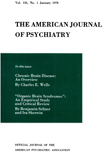Hysterical psychosis and hypnotizability
Abstract
The very existence of hysterical psychosis as a diagnostic entity has been questioned as part of the general difficulty in defining both hysteria and psychosis. However, several recent investigations have documented a syndrome that usually involves brief and intense periods of psychotic behavior, generally with graphic decompensation, severe environmental stress, and rapid recompensation, in individuals with other hysterical features. The authors assert that such a syndrome does exist as a clinical entity and that the differential diagnosis can be facilitated by using a standardized measure of hypnotic trance capacity. They hypothesize that patients with hysterical psychosis are highly hypnotizable, while those who are schizophrenic and psychotic have low hypnotizability. The authors review the literature and present two case examples.
Access content
To read the fulltext, please use one of the options below to sign in or purchase access.- Personal login
- Institutional Login
- Sign in via OpenAthens
- Register for access
-
Please login/register if you wish to pair your device and check access availability.
Not a subscriber?
PsychiatryOnline subscription options offer access to the DSM-5 library, books, journals, CME, and patient resources. This all-in-one virtual library provides psychiatrists and mental health professionals with key resources for diagnosis, treatment, research, and professional development.
Need more help? PsychiatryOnline Customer Service may be reached by emailing [email protected] or by calling 800-368-5777 (in the U.S.) or 703-907-7322 (outside the U.S.).



